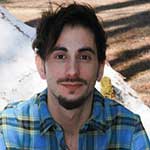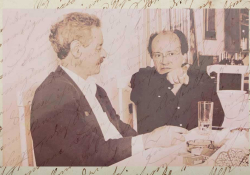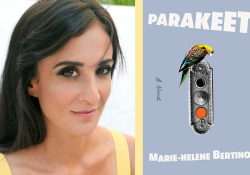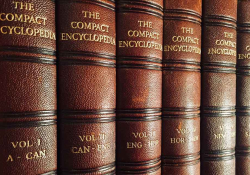“Translation Is the Opposite of War”: A Tribute to Sarah Maguire

True translators take to their craft so intensely that they tend to hurtle toward invisibility, and in Britain, the land of the Anonymous Translator, nobody paid a greater price for their devotion to world poetry than Sarah Maguire (1957–2017), who died in November 2017 following a protracted battle with cancer. Maguire’s final work, Almost the Equinox: Selected Poems (Chatto & Windus, 2016), featuring excerpts from her three collections, is nothing shy of a monument to one of London’s most unabashedly cosmopolitan voices. The book opens in the English capital, where Maguire has brought back three oranges from the Moroccan village of Taliouine. Not long later the scene has shifted to the United States, with Maguire “Traveling Northward” through icy Connecticut, where “only the restless and the homeless / risk the streets tonight.” A few poems later, we find her in Baltimore, in a room across from “The Maryland State Penitentiary,” which she portrays as a “huge cathedral of punishment” with “one gothic window tall enough for prayer.” Next, she’s in Tangiers, where young African men yearning for Europe’s promised land, “an idea bruising / the far horizon,” “climb these crumbling ramparts / and face north / like true believers.”
A restless chronicler of our planet’s cities, Maguire’s postcard-poems from Palestine, Greece, Afghanistan, and Kazakhstan—to name only a few of her destinations—exemplify her firm grasp of the historical contexts around her as well as her penchant for hard-edged descriptive detail. Almost the Equinox is studded with gorgeously condensed miniatures like “Petersburg,” where “infinite vistas master the Neva / in a hard embrace—its bedrock / the countless hands of slaves, / impossibly gilded, furnishing the swamp”; or “Ramallah,” which Maguire describes as “a provisional city / a concatenation / of loose roundabouts / building sites / and razor wire—scars of forced demolitions.”
At a time when an entire people were being demonized to suit geopolitical interests and corporate balance sheets, silence was no longer an option, and translation, Maguire believed, was the “opposite of war,” and she waged that fight just as ruthlessly as the merchants of death she so deeply detested.
Maguire’s fervent antiprovincialism, which swung between hope and despair, is prominently on display. In “May Day, 1986,” dedicated and addressed to the Polish poet Tadeusz Sławek, she elegizes the difficulties of distance and the stultifying effects of the twenty-four-hour news cycle—then still in its infancy—against the backdrop of the fallout from the Chernobyl disaster: “I think of your letter / in my drawer with the handkerchiefs, / one page torn by an earlier reader. Socrates / distrusted writing, its distance from / the grain of the voice. I come indoors / to write you all the things I couldn’t say / a year ago. Later, on the news, they will show / gallons of contaminated Polish milk / swilled into sewage, a boy crying / at the sting of iodine he must swallow / against the uncertain air.” Another remarkable example in this vein is “From Dublin to Ramallah,” which is dedicated to the Palestinian poet Ghassan Zaqtan:
Closer to home and to exile:
I seek for this greeting the modesty of rainwater,
the wet from ordinary clouds
that darkens the soil, swells reservoirs, curls back
the leaves of open books on a damp day into rows of tsunami.
And, once in a while, calls for song.
I ask for a liquid dissolution:
let borders dissolve, let words dissolve,
let English absorb the fluency of Arabic, with ease,
let us speak in wet tongues.
Look, the Liffey is full of itself. So I post it
to Ramallah, to meet up with the Jordan.
While some of Maguire’s coevals in the New Generation list (1994) nursed a fascination and engagement with non-English cultures and languages—Jamie McKendrick, Michael Hofmann, and W. N. Herbert perhaps being the most notable examples—no British poet of her time ever came close to making such a similarly radical statement: that is, that English would be well served by incorporating the fluency of Arabic. In all honesty, I cannot picture any British poet of my generation making such a proclamation, let alone hers.
Nevertheless, “From Dublin to Ramallah” was merely the poetic summation of Maguire’s lifelong dedication to non-English poetry—and Arabic poetry in particular—a dedication whose origins can be traced to one of her earliest trips to the Middle East. As she related in her StAnza Festival lecture, “Singing about the Dark Times: Poetry and Conflict,” in 2008:
When, in 1996, I was the first writer sent to Palestine by the British Council, I decided that I was going to use my position in the British poetry establishment to encourage and promote the translation of Palestinian and Arabic poetry. I wanted people to recognise that the Palestinians, Arabs, and Muslims in general have an extraordinarily rich and complex culture, culture that is most importantly expressed in their poetry since, in Islamic societies, poetry is regarded as the highest art form and is accorded great importance. . . . Our, peculiarly Western, anxiety that “poetry makes nothing happen” is greeted with hilarity, bafflement, and incredulity by the poets I’ve been privileged to make friends with, many of whom come from the most conflict-scarred places on earth such as Iraq, Afghanistan, Somaliland, Palestine, and Sudan. They can’t understand why anyone could possibly think that poetry could be irrelevant since, to them, poetry is de facto the most important—and relevant—art form of their cultures. [. . .] It is striking how the poetry and cultures of non-European, and specifically Islamic, countries have been largely greeted with ignorance and smug indifference.
* * *
Inspired by a residency at the School of African and Oriental Studies in the early 2000s, then as now home to a wonderfully varied crowd of polyglots, Maguire decided to concretize her views on translation into an organization that would aim to inject artistic engagements with non-European cultures into the heart of the British poetry establishment.
As the interminable War on Terror began to swing into full gear, Maguire founded the Poetry Translation Centre in 2004 on a simple but necessary premise: assemble small groups of linguists, poets, and impassioned readers to produce readable and enjoyable English renditions of poems written in non-English languages. The intended result was equally simple: at a time when an entire people were being demonized to suit geopolitical interests and corporate balance sheets, silence was no longer an option, and translation, Maguire believed, was the “opposite of war,” and she waged that fight just as ruthlessly as the merchants of death she so deeply detested.
The results, for anyone who attended one of her workshops, were mesmerizing. A poet whom almost nobody in the room had ever heard of before would be introduced, their work would be read out in both the original language and its literal crib, and their life and cultural context would be discussed. A collaborative translation involving everyone present would then slowly, but surely, take shape over the course of the subsequent hour and a half—the proceedings held together by Maguire’s prickly yet earnest charm. Maguire further thought it necessary to ensure that the PTC’s translation efforts wouldn’t be restricted to white-only audiences, as is so frequently the case, and as many will attest, her insistence on connecting the UK’s expatriate diasporas to the PTC’s poets and translators through her series of nationwide tours and readings enabled the invited artists to truly connect with their own people as much as with their host culture.
The method of translation Maguire pioneered at the PTC was thus both publicly accessible—even lay readers could show up and through the strength of their suggestions see a word or line seep into the final translation—and yet highly attuned to Maguire’s scholarly resolve to see as much of the original poem’s so-called otherness transferred into English. Its success was reflected in its popularity among PTC workshop attendees, and only fourteen years after its establishment, the PTC’s current roster includes over 120 poets from Latin America, Asia, and Africa, including Masoud Ahmadi (Iran), Frankétienne (Haiti), Hilda Hilst (Brazil), David Huerta (Mexico), Euphrase Kezilahabi (Tanzania), Farzaneh Khojandi (Tajikistan), Abdellatif Laâbi (Morocco), Partaw Naderi (Afghanistan), Ribka Sibhatu (Eritrea), and one of Somalia’s greatest modern poets, Maxamed Ibraahin Warsame, aka “Hadraawi.”
Maguire’s true north as a translator was her commitment to undermining what she termed the “Imperial method” of translation as routinely practiced by many Western universities and literary establishments.
As far as Maguire was concerned, the PTC’s collaborative approach kept most workshop participants firmly rooted in modesty, a quality she believed was otherwise absent in most Western translation circles, whether academic or literary. Reflecting on her first five years as head of the PTC, Maguire plainly laid out her concerns in her StAnza lecture:
Translating poetry, especially if, like me, you don’t speak the language of your poet, demands patience and humility. What I’ve never wanted to produce are those show-off translations, so beloved of some of my colleagues, who use a distinguished poet’s work to further their own careers and who have a cavalier attitude (at best) to the original poet’s genius. [. . .] Translation always involves the translator taking a position—an aesthetic position and an ethical position. Does the translator wish to negotiate with, or to dominate, the poet they’re translating? Is their main aim to enhance their own reputation, or do they want to introduce a new voice into English poetry by attempting to render the original poet’s own work as vividly and vitally as possible? Plundering another poet’s work to produce yet another riff on your own anomie is child’s play.
As such, Maguire’s true north as a translator was her commitment to undermining what she termed the “Imperial method” of translation as routinely practiced by many Western universities and literary establishments. As far as she was concerned, this “method” utterly disregards the aforementioned aesthetic and ethical positions a translator should take and instead turns the translated poem into a commodity, which is then traded—or not—according to said university or press’s own interests. While Maguire believed translation could constitute an alternative to war, she also knew that it could be turned to nefarious ends. Bad translations, she often noted, especially the ones that reeked of foreignese—broken English utterly divorced from the poem’s original language or context—could be held up by jingoists as proof of the English language’s uncontested supremacy and the worthlessness of other, “shithole” cultures. On other hand, the same bad translations could also be employed by liberals to amplify their virtue signaling, a disingenuous way to prove one’s engagement with the wider world. In this second instance, translation is deprived of all its transformative artistic and social potential and turns into a hollow gesture: like buying a charity bracelet secondhand.
* * *
I owe much of what I am as a translator to Sarah Maguire, and I led a series of workshops for her at the Poetry Translation Centre for five years, from late 2010 to mid-2016, not long before I left London to relocate to the United States. By the time the news of Sarah’s death reached me in late 2017, I hadn’t seen her in over a year. Although her illness had debilitated her to the point she could no longer keep up with any social engagements, she always poured whatever little energy she had left into the PTC’s work. This was why I felt very fortunate to have been able to attend the launch of the PTC’s landmark anthology, My Voice: A Decade of Poems from the Poetry Translation Centre (Bloodaxe) in the summer of 2014 at the Southbank Centre. Featuring poems written in twenty-three languages with the originals en face, all of the forty-five poets included in its pages, I like to think, carried a bit of Sarah inside them: all are politically engaged poets who managed to cling to their lyricism and to their belief in themselves as citizens of the world through the worst of these dark, xenophobic times. While it was no doubt heartwarming to see such a fitting testament to Sarah’s work see the light of day, the launch of My Voice was also a very melancholy occasion, given that Sarah had recently been diagnosed with the cancer that would ultimately claim her life.
A vital, almost unconsciously necessary presence on the British poetry scene for three decades, the final years of Sarah Maguire’s life brought her a little acclaim, albeit not nearly enough as she deserved. “Passages,” a tribute to a stowaway who died after falling from an airplane at Heathrow airport, printed in her last full-length collection, The Pomegranates of Kandahar (Chatto & Windus, 2007), was shortlisted in the best poem category of the Forward prizes in 2005. Two years later, her co-translation of Atiq Rahimi’s novel A Thousand Rooms of Dream and Fear (Chatto & Windus) was longlisted for the Independent Foreign Fiction Prize. Nevertheless, despite these laurels, success never rested easily on her shoulders. Sarah preferred the outsider’s stance, a viewpoint she likely sharpened after dropping out of school at sixteen in the mid-1970s to become a gardener with the council in Ealing, becoming the first woman to do so.
Translation has become distinctly fashionable, and translation-focused presses and organizations proliferate like mushrooms, led by young impresarios flush with arts grants and donations. Unfortunately, most of them seem incapable of doing anything except pumping out a stream of ill-conceived titles that merely anthropologize other cultures: recent titles such as Don’t Panic, I’m Islamic: Words and Pictures on How to Stop Worrying and Learn to Love the Alien Next Door, Refugee Tales, and Banthology: Stories from Unwanted Nations spring to mind as good examples of what Sarah meant when she talked about disingenuous so-called translators plundering other cultures to produce yet another riff on their own anomie. Sarah was right: it is child’s play, and as such it would behoove the incoming hordes of white, middle-class practitioners of translation to take a page out of Sarah Maguire’s manual on the ethical responsibilities attached to the job. When James Byrne asked her in an interview whether poets could be trusted, Sarah’s characteristically barbed reply was: “Some of us can be. Others you know are fakes from the beginning. There are some poets who have an uncanny knack of tapping into the zeitgeist, producing what the age wants to hear. Though it may suit in the time it was written, it may not be trusted to breathe so well outside its era.”
I was glad to hear Sarah’s room in the hospice where she breathed her last was filled with flowers, only natural given her lifelong love of botany and horticulture. Sarah’s anthology, Flora Poetica: Poems about Flowers, Trees and Plants (2001), remains essential reading and I’m sure will be treasured for years to come. Nevertheless, like a true Londoner, Sarah never lived in a house with a garden, and that, perhaps, might be an apt metaphor for the frustration she experienced at being a cosmopolitan trapped in a British body, looking out of a stuffy flat at the wider world beyond.
Hudson, New York











